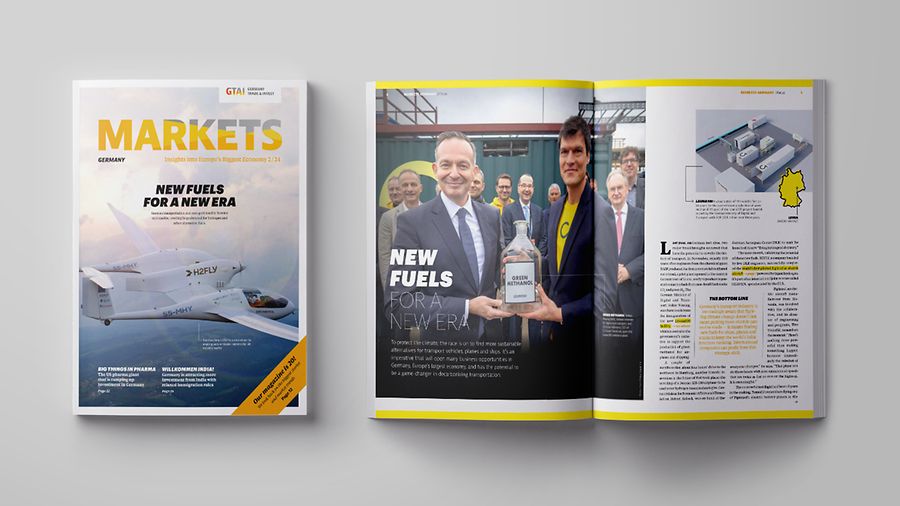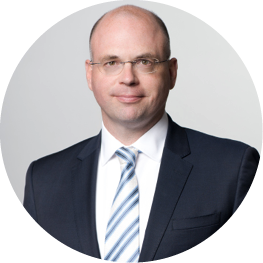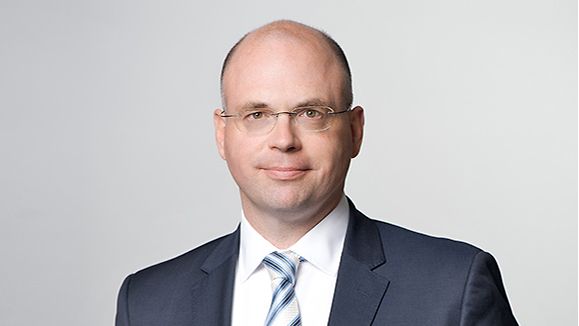Markets Germany Magazine 2/24 | Biotechnology
Good Karma in Biotech and Pharma
American pharmaceutical giant Eli Lilly is radically expanding its presence in Germany.
That’s great news for the country, which sees biotech and pharmaceuticals as one of its
main pillars for the years to come.
Aug 23, 2024
In April 2024, ground was broken on a flagship project that signals what the future may hold in store for Germany’s pharmaceutical and biotech industries. US-based Eli Lilly is investing EUR 2.3 billion (USD 2.5 billion) in a new plant in the western German town of Alzey in the state of Rhineland-Palatinate. The company, which focuses on treating serious dis[1]eases like diabetes, obesity and dementia, aims to have the new facility up and running by 2027. Once operational, the high-tech site will employ up to one thousand people including engineers, operators and scientists.
Founded in 1876 and headquartered in Indianapolis, Indiana, Eli Lilly’s investment in Germany reflects both a growth in global demand for its products and a desire to capitalize on the country’s long tradition of pharmaceutical know-how. The company already has a presence in Germany, though so far it has been focused mainly on the areas of development, marketing and distribution. Alzey will be its first production site and will benefit from its prox[1]imity to Lilly’s other European manufacturing sites, most notably Fegersheim, France. The company’s expanded European presence will help to foster cooperation with universities and governments and to create local partnerships.
Choosing a location: “Germany inside the European Union is still a highly attractive place,” says Gerd Kräh, a government affairs executive at Eli Lilly, adding that the country’s reputation as a “cradle of the pharmaceutical industry” was an additional pull. The facility at Alzey will primarily focus on producing Mounjaro, an injectable prescription drug used to treat Type 2 diabetes and in some cases obesity. Goldman Sachs estimates the potential global market for obesity drugs could reach USD 100 billion by the year 2030. In the future, Eli Lilly may also expand its output to include other incretins.

This article was published in issue 2-2024 of the Markets Germany Magazine. Read more articles of this issue here
When scouting for a suitable site for the plant, Eli Lilly turned to Germany Trade & Invest (GTAI), the government’s international business promotion agency. “We found that they were very helpful in terms of using their database, their knowledge and their expertise to find our requirements in terms of what would be a proper location,” says Kräh.
Accelerating biotech Innovation
In addition to its investment in Alzey, Eli Lilly also plans to spend up to EUR 92 million (USD 100 million) on life science and biotech start-ups in Germany. The money will be put into relevant venture capital funds with the aim of building strategic partnerships and speeding up innovation in research and development.
Eli Lilly’s investment in Germany’s biotech scene comes at the same time as a government drive to speed up the approval of clinical trials in the country — a commitment enshrined in the Medical Research Act, which forms a core part of the new National Pharma Strategy.
“The health ministry’s Medical Research Act presents the right approach,” says Kai Joachimsen, CEO of the German Pharmaceutical Industry Association (BPI), a trade group representing the interests of around 270 pharma companies. “Now the Focus must turn to speed of implementation — pharma-level speed!”
Eli Lilly is not alone in its conviction that Germany excels in pharmaceutical manufactur[1]ing. Last year Swiss pharmaceutical giant Roche invested a total of EUR 1.4 billion in the country, expanding its various facilities to include a new research center and global customer service hub. A further EUR 1 billion has been earmarked for its German operations over the next three years. The western German regional states of Rhineland-Palatinate, Hesse and Baden-Württemberg in particular have made a Name for themselves as R&D hubs. Industry titans Boehringer Ingelheim, Merck and BioNTech are all headquartered in the region, with other big players, including US biomedical company AbbVie, employing some 3,000 people there. Now Eli Lilly is joining the club.
“Biotechnology was really under the radar in Germany until the pandemic”

When Eli Lilly decided to make a major investment in Germany, they turned to GTAI for help selecting the perfect location for a future production site. They had very specific requirements, says Marcus Schmidt, GTAI’s Chemicals and Health director.
Marcus, first of all, could you give us a brief overview of the importance of Germany’s pharmaceutical sector and what makes it stand out?
Germany is the fourth-largest pharmaceutical market worldwide, after the United States, China and Japan. In terms of the sheer number of medications available per country, Germany comes out on top in the European Union. It only takes about 50 days on average from regulatory approval until a patient actually has access to a medication on the shelves. The EU average is about 500 days, so ten times as long. That’s because in Germany there’s a parallel process for price negotiations, while in most other countries they first negotiate prices and then decide whether to introduce a drug or not.
How did GTAI support Eli Lilly in completing its big investment in Germany?
MS: The main service was to help in the site selection process. They had very specific requirements, not just for the size of property, but for logistics, utilities, workforce availability and timelines that had to be met for the start of construction. We worked very closely with our local partners on a state and regional level and evaluated possible sites. There were probably about 60 sites we looked into in more detail until we found a really good match. As well as its new production plant at Alzey, Eli Lilly is also making a significant investment in Germany’s biotech scene.
How much of an impact will that have?
MS: I think biotechnology was really under the radar for many years in Germany until the pandemic happened. And then BioNTech came into the limelight and people realized what huge potential there is in Germany. And it’s not just BioNTech. There are so many other innovative life sciences companies here, many of them not really known to the public. They work well with large pharmaceutical companies, and together they develop new products and bring them to market. I think Lilly is very smart to invest in these and tap into this huge potential. This venture capital investment will benefit both the biotech companies as well as the pharmaceutical companies — it’s sometimes a little hard to distinguish between the two because they are so closely linked. This is certainly great news for Germany.
